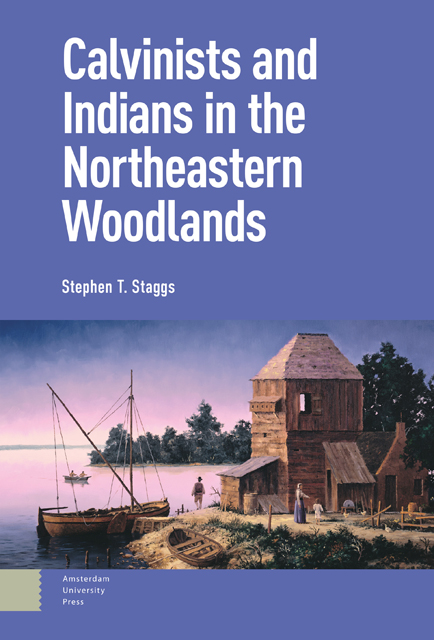Book contents
- Frontmatter
- Contents
- Acknowledgements
- Abbreviations
- List of Figures
- Notes on Usage
- Introduction
- 1 “Gentiles by Nature,” 1566–1626
- 2 “So That the Fullness of the Gentiles Might Gradually Come In,” 1627–1642
- 3 “A Church and Community among the Christians and the Blind Gentiles,” 1642–1652
- 4 “We, with God’s Help, Hope to Bring the Barbarous Tribes to Devotion,” 1652–1660
- 5 “Who Gave Jacob for a Spoil and Israel to the Robbers?” 1660–1664
- 6 “A Gentile Woman, Karanondo, … Now Called Lidia,” 1664–1750
- Conclusion
- Appendix A Dutch References to Indians: 1609–1664
- Appendix B Indian Baptisms, Professions of Faith, and Marriages in the Dutch Reformed Churches of New York: 1690–1750
- List of Archival Sources
- Bibliography
- Index
5 - “Who Gave Jacob for a Spoil and Israel to the Robbers?” 1660–1664
Published online by Cambridge University Press: 17 October 2023
- Frontmatter
- Contents
- Acknowledgements
- Abbreviations
- List of Figures
- Notes on Usage
- Introduction
- 1 “Gentiles by Nature,” 1566–1626
- 2 “So That the Fullness of the Gentiles Might Gradually Come In,” 1627–1642
- 3 “A Church and Community among the Christians and the Blind Gentiles,” 1642–1652
- 4 “We, with God’s Help, Hope to Bring the Barbarous Tribes to Devotion,” 1652–1660
- 5 “Who Gave Jacob for a Spoil and Israel to the Robbers?” 1660–1664
- 6 “A Gentile Woman, Karanondo, … Now Called Lidia,” 1664–1750
- Conclusion
- Appendix A Dutch References to Indians: 1609–1664
- Appendix B Indian Baptisms, Professions of Faith, and Marriages in the Dutch Reformed Churches of New York: 1690–1750
- List of Archival Sources
- Bibliography
- Index
Summary
Abstract
Chapter five opens with the arrival of two new Dutch Reformed pastors in New Netherland in 1660 and closes with the conclusion of peace with the Esopus Indians in 1664. Although armed with the Testaments in nine volumes and letters that underscored the fact that the directors of the Amsterdam Chamber of the West India Company still hoped to harvest both commercial and spiritual fruit in North America, there is no evidence to suggest that the pastors in and around New Amsterdam carried on any significant missionary activity among neighboring Native American communities during this period. This was due, in part, to the shortage of ministers and the deterioration of Esopus–Dutch relations.
Keywords: Native–Dutch Relations, New Netherland, Mahican Indians, Lenape Indians, Haudenosaunee, Dutch Calvinism
Amsterdam, 1660
On March 29, 1660 Dominees (Reverends) Hermannus Blom and Henricus Selijns boarded De Vergulde Bever (The Gilded Beaver) in Amsterdam with the Testaments in nine volumes. The volumes contained the formula for baptism to which the directors of the Amsterdam Chamber expected the predikanten (preachers) of Nieuw Nederland (New Netherland) to adhere and a letter in which the directors informed Stuyvesant that Blom was to be sent to the Esopus and Selijns to Lange Eylandt (Long Island) to advance the gospel. Letters such as these underscore the fact that the directors of the Geoctroyeerde West-Indische Compagnie (Chartered West India Company or WIC) hoped to harvest both commercial and spiritual fruit in North America. Yet, there is no evidence to suggest that the dominees in and around Nieuw Amsterdam (New Amsterdam)—Johannes Polhemus (Lange Eylandt: 1654–1676), Henricus Selijns [Breuckelen (Brooklyn): 1660–1664; New York: 1682–1701], Samuel Megapolensis (New York: 1664–1668), Agidius Luyck (New York: 1671–1672), and Wilhelmus van Nieuwenhuysen (New York: 1671–1681)—carried on any significant missionary work among Indians in the latter part of the seventeenth century. This was due, in part, to the shortage of ministers and the deterioration of Indian–Dutch relations on the lower Muhheakantuck (Hudson River).
Nieuw Amstel, 1660
Less than two weeks after Dominees Blom and Selijns departed Amsterdam, the Council in Nieuw Amsterdam heard testimony from colonists living on the Zuid Rivier (South River—known as the Delaware by the English). They told the Council members that brandy was being openly sold to Indians throughout the region.
- Type
- Chapter
- Information
- Calvinists and Indians in the Northeastern Woodlands , pp. 169 - 194Publisher: Amsterdam University PressPrint publication year: 2023



